Adding your WordPress site to Google Search Console (formerly Google Webmaster Tools) is an important step for SEO because it provides essential tools that help website owners monitor their ranking in Google search results and discover issues that may affect their ranking.
GSC is one of the WPBeginner team’s most important tools. We use it to identify keywords users search for, pinpoint errors, and understand our ranking on search engine results pages (SERPs). This lets us make data-driven decisions on improving our SEO and increasing our traffic.
By regularly reviewing the information in Google Search Console, you can do the same to ensure that your site is well-optimized and compliant with Google’s best practices.
This guide will show you how to easily add and verify your WordPress site in Google Search Console so you can use its powerful features to improve your search visibility.
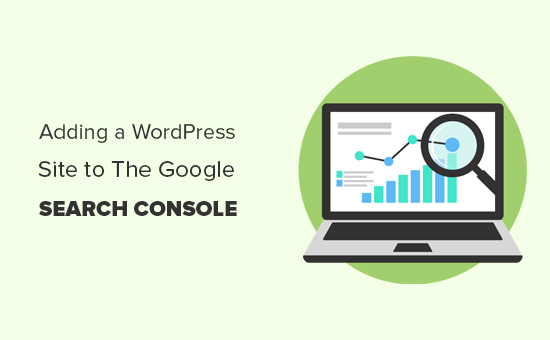
What is Google Search Console?
Google Search Console is a free tool offered by Google to help website owners monitor their website’s presence in Google search results.
It helps you track search rankings along with keeping you updated about site errors, security issues, and indexing issues that may affect your website’s search performance.
If you are serious about WordPress SEO, then you need to add it to Google webmaster tools from day one.
That being, let’s take a look at how to easily add your site to Google Search Console.
Video Tutorial
If you’d prefer written instructions, just keep reading.
Adding Your WordPress Site to Google Search Console
First, you need to visit the Google Search Console website and click on the ‘Start Now’ button.
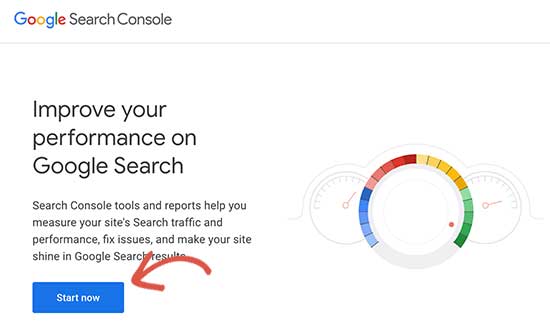
Next, you’ll need to sign in with your Google / Gmail account.
Once logged in, you’ll be asked to enter your website URL.
There are two methods for site verification: domain name or URL prefix. We recommend the URL prefix method because it is more flexible.
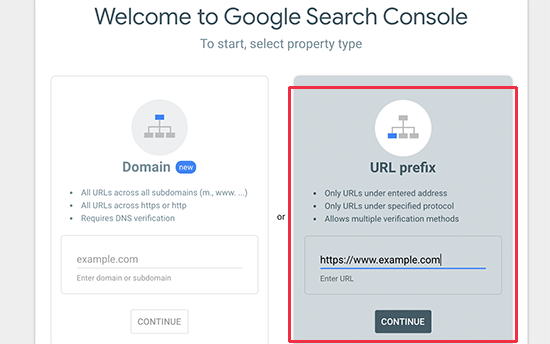
Keep in mind that Google considers HTTP and HTTPS as two different protocols. It also considers https://www.example.com and https://example.com as two different websites.
You need to enter the correct website URL used by WordPress.
If you are unsure, then there is an easy way to find out the exact URL you need to enter. Simply log in to your WordPress admin area and go to Settings » General page.
There you will see your website’s URL in the site address field.
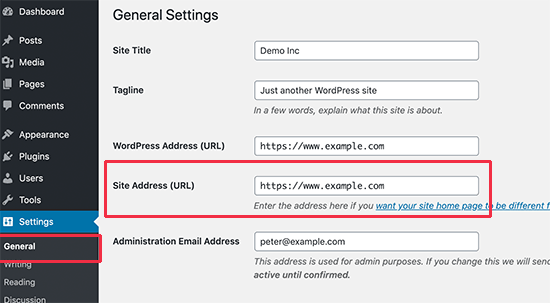
After entering your correct website address in the Google webmaster tools setup wizard, click on the ‘Continue’ button to go to the next step.
Now, you’ll be asked to verify ownership of your website. There are several ways to do that, but we will show the HTML tag method because it is the easiest one.
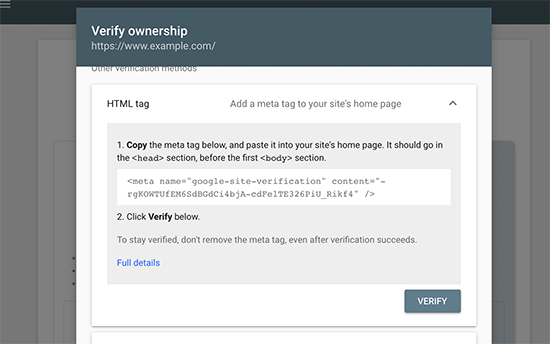
Click on the HTML tag to expand it and then copy the code inside it.
Now, you need to add this Google site verification meta tag in WordPress, so Google can verify that you are the owner of the website.
Most WordPress tutorials will guide you to just edit the header.php file in your WordPress theme and add the code just above the <body> tag.
However, we don’t recommend this method because if you update or change your theme, then the HTML tag will disappear.
Google periodically checks for the HTML tag and will disable your access to the site data in the search console if it cannot find the verification tag.
Here is how to make sure that Google can always verify your ownership of the website.
First, you need to install and activate the All in One SEO plugin. For more details, see our step by step guide on how to install a WordPress plugin.
Upon activation, go to All in One SEO » General Settings » Webmaster Tools page and click on “Google Search Console”.
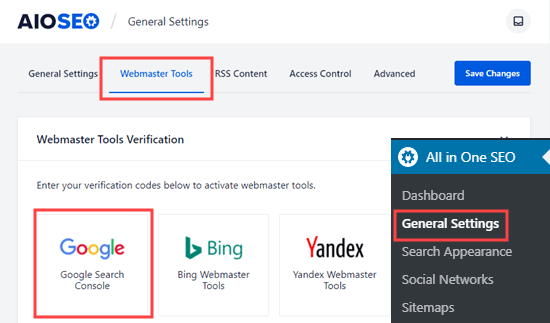
Then paste the code you copied from Google Search Console into the “Google Verification Code” box.
Don’t forget to click on the ‘Save Changes’ button to store your changes.
You can now go back to Google Search Console settings and click on the ‘Verify’ button.
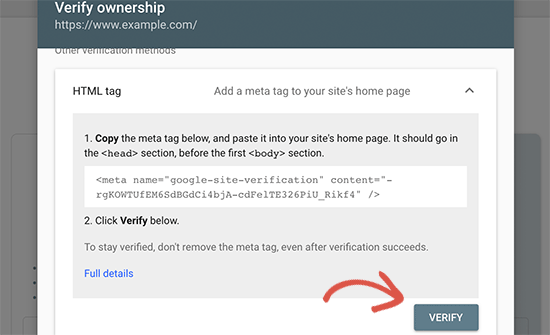
Google Search Console will now look for the HTML tag in your website code and will show you a success message.
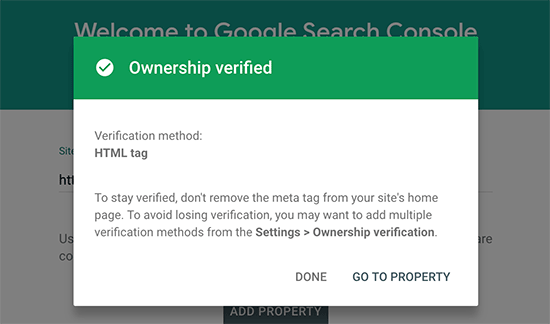
Note: If you don’t see a success message, then you need to clear your WordPress cache. This will ensure that Google can fetch the latest version of your website.
That’s all. You have successfully added your site to the Google Search Console (Webmaster tools). You can now click on the ‘Go to Property’ link to visit your Google Search Console dashboard.
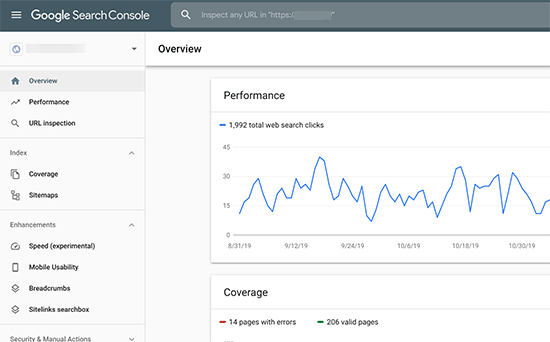
From here, you can see your website’s performance reports and index coverage.
Before you do that, let’s tell Google a little bit more about your website. This will help Google crawl your website a bit more efficiently.
Add XML Sitemap to Google Search Console
An XML sitemap is a file that lists all your website content in XML format, so search engines like Google can easily discover and index your content.
The good news is, if you installed the All in One SEO plugin in the steps above, you’ve already added an XML sitemap to your site automatically.
To see your sitemap, go to All in One SEO » Sitemaps. From here, you can see the sitemap is automatically enabled for you.
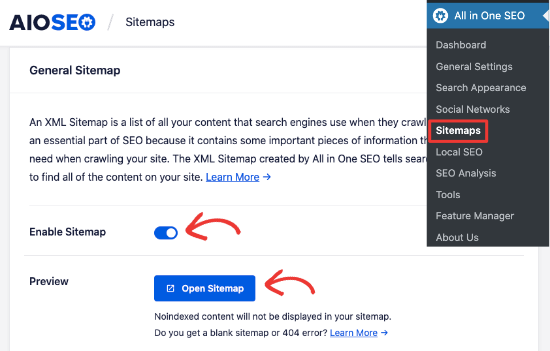
Next, you need to get the XML sitemap link. Simply click on the ‘Open Sitemap’ button, and you will see a link to your XML sitemap.
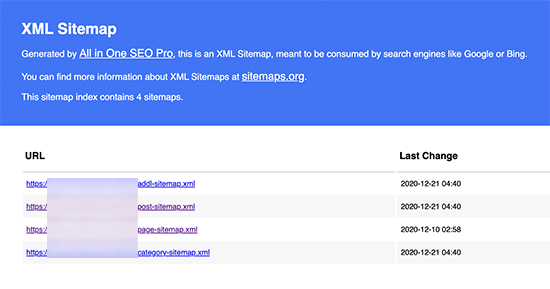
From here, you can just copy the URL from your browser’s address bar.
Alternatively, you can directly access your XML sitemap by adding sitemap.xml at the end of your website address. For example:
https://www.example.com/sitemap.xml
Now that you have the XML sitemap ready, let’s help Google find it quickly.
Simply switch to the Google Search Console dashboard and click on the Sitemaps menu from the left column.
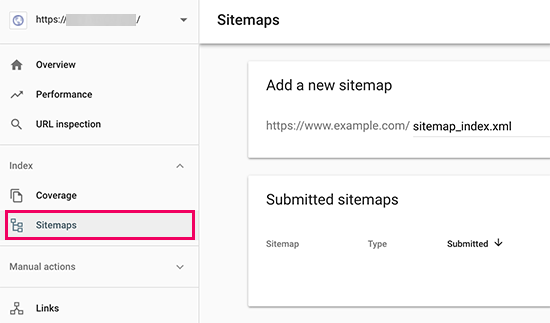
After that, you need to add the last part of your sitemap URL under the ‘Add new sitemap’ section and click the Submit button.
Google will now add your sitemap URL to your Google Search Console.
AIOSEO also comes with several other sitemaps, like video sitemap, news sitemap, and RSS sitemap, that all help you get a competitive advantage and rank higher in SEO.
The process of submitting those sitemaps is the same as above.
That’s all, you have successfully added your website to Google Search Console.
View Google Search Console Data Inside WordPress with AIOSEO
The next step is to learn how to use the treasure trove of information in Google Search Console to grow your business.
We have a complete Google Search Console guide for beginners, which shows you how to make the most out of Google Search Console data.
But, you can also easily view a lot of this important data right from your WordPress dashboard using the AIOSEO Search Statistics addon.
With AIOSEO’s Search Statistics, you can track your keywords, view your top-performing content, discover valuable search statistics, and more, inside WordPress. This means that you don’t have to waste time switching from WordPress to Google Search Console to find the data you’re looking for.
Once Search Statistics is connected to Google Search Console, simply click on ‘Search Statistics’ in the AIOSEO menu from your WordPress dashboard.
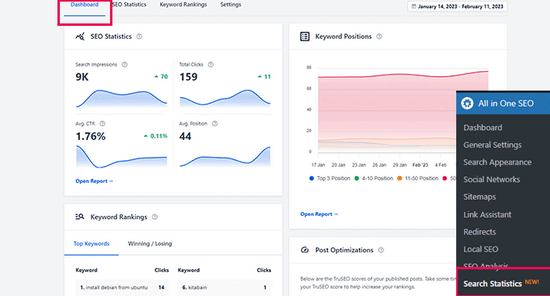
This will bring you to the Search Statistics dashboard. From here, you can see SEO Statistics, such as the search impressions, total clicks, average click-through rate (CTR), and average position of all of your content.
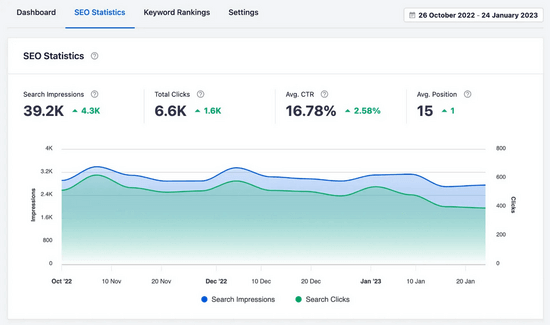
You can also use the Keyword Performance report to see which keywords your website content is ranking for in Google search results. By clicking on the ‘Top Winning’ and ‘Top Losing’ tabs, you can see what keywords have seen the biggest position changes.
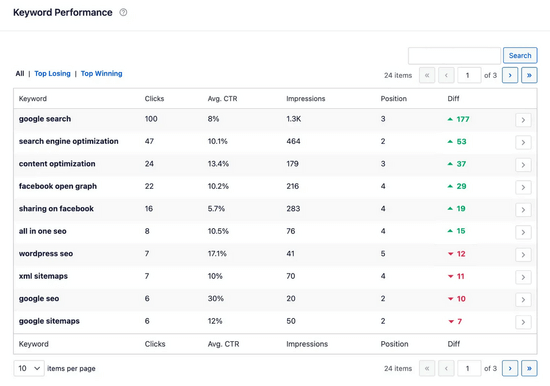
In addition, with the powerful Content Rankings report, you can easily spot content decay and important content performance trends.
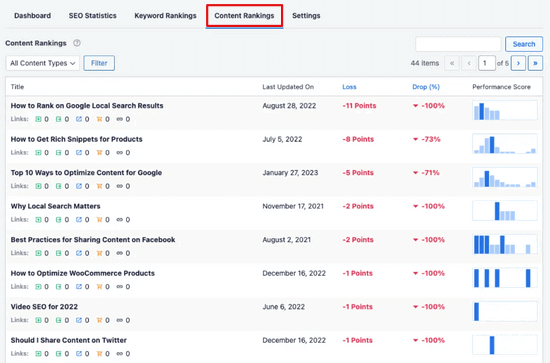
It will show you the date a URL was last updated, details about the rate at which your content is decaying, and other essential SEO and content marketing metrics.
Using AIOSEO’s built-in SEO recommendations, you can easily optimize your decaying content to boost your rankings again.
You’ll also get helpful reports for improving the user experience (UX) on your site, tips for troubleshooting issues that are negatively affecting your SEO, and more.
Google Search Console and WordPress FAQs
Having helped thousands of readers add and verify their websites in Google Search Console, we have seen just about every question you can think of. Here are the answers to some of the most frequently asked questions.
1. How can I upload a Google HTML verification file to my WordPress blog?
Google Search Console allows a few different ways to verify website ownership. In this article, we covered the easiest method, which is to use the Google site verification meta tag. However, some website owners prefer to upload the HTML file to verify site ownership.
To upload the Google search console HTML verification file to WordPress, you will need to log in to your WordPress hosting cPanel or connect to your hosting account using FTP.
Next, you need to upload the HTML verification file inside the /public_html/ folder of your website. This is the root directory where you’ll see other WordPress folders like /wp-admin/, /wp-content/, etc.
2. Should I use a Google Site verification plugin for WordPress?
There are many WordPress plugins that are designed specifically to help you with Google site verification. However, you don’t need to use them because you’ll likely need to verify ownership on other webmaster tools and platforms like Bing, Yandex, Pinterest, etc.
It’s much better to use the All in One SEO plugin because it lets you add site verification for all platforms (in a single plugin). Not to mention, it also has a ton of other WordPress SEO features to help you rank better and get more traffic.
3. How can I become a power user of Google Search Console?
Google Search Console has a lot of useful information that you can use to grow your business. We have created the ultimate Google Search Console guide that you can use to become a power user.
4. I’m running into problems, is there a Google Search Console phone number that I can contact?
No, there’s no Google Search Console phone number that you can contact. If you’re running into problems with Google Search Console, then you can use their online support center. For specific questions about WordPress, you can always join our free WordPress help group to ask your questions.
We hope this article helped you learn how to easily add your WordPress site to Google Search Console. You may also want to see our guide on how to get more traffic to your website, and our list of tips on using Google Search Console to grow website traffic.
If you liked this article, then please subscribe to our YouTube Channel for WordPress video tutorials. You can also find us on Twitter and Facebook.





Dennis Muthomi
very informative guide! I found it really helpful for adding my site to Google Search Console. The step-by-step instructions made the process a breeze
I also have a question: Since my site is now on Google, I’m thinking about adding it to DuckDuckGo as well. I know they’re different search engines, but is the process similar, or should I take a different approach when submitting my website to them?
I’d love to hear your thoughts on this
WPBeginner Comments
We happen to have a guide on how to submit your site to other engines like DuckDuckGo. For details, check out: https://www.wpbeginner.com/beginners-guide/how-to-submit-your-website-to-search-engines/
Dennis Muthomi
Thank you for linking me to the guide on submitting sites to other search engines.
I have read through the guide, I can see that the process for each search engine does vary a bit.
The steps you provide for submitting to DuckDuckGo is very straightforward though
Thanks again for all the helpful resource!
Ben
Hello. I followed the steps, waited about 30 minutes, and my website is still not showing up on google search. Is there a setting on WordPress I need to change to allow my site to be found via AIOSEO?
WPBeginner Support
For having your site appear in search results, you would want to take a look at our guide below that covers how to have your site in Google’s search results:
https://www.wpbeginner.com/beginners-guide/how-do-i-get-my-wordpress-site-listed-on-google-beginners-guide/
Admin
Jiří Vaněk
Is there any way I can easily change the domain name in the google search console if there is a migration, or do I have to add the domain again using the same instructions and will I lose the previous data? I am also concerned with a situation where the client, for some reason, decides to use a domain without www instead of a domain with www at the beginning.
WPBeginner Support
If you change your domain then Google has a change of address tool that you can use to migrate your information to the new domain’s search console.
Admin
Jiří Vaněk
Thanks for the information, I was looking for a solution and finally found one. The migration to another domain went smoothly without any issues. I just needed reassurance that it would work. Thank you for taking the time to share your experience. I really appreciate it.
Wilfried HOUNTON
This content save my life
WPBeginner Support
Glad our guide could help get your site in Google Search Console.
Admin
Moinuddin Waheed
I have faced this problem with one of my blog while adding it to Google console. Actually I couldn’t find the option to complete the authentication part where by I need to put the code snippet inside the domain name to verify. I opened my GoDaddy dashboard and followed the steps that the option was not available in my dashboard.
Thanks for the guide on adding sites to Google search Console.
WPBeginner Support
You’re welcome, glad our guide was helpful
Admin
Lewis
Is it normal for Google Search Console to add a trailing slash after the website URL for the URL prefix method?
WPBeginner Support
It is normal
Admin
penny H
Hi, is there a method that I don’t need to install any plugins, just copy the code to my WordPress Site, add it Google Search Console?
WPBeginner Support
It would require you to edit your theme’s files which would cause a problem if you update your theme which is why we recommend plugins to also make the process easier and not run into the issue of losing it when updating your theme. If you’re worried about the number of plugins we recommend taking a look at our article below:
https://www.wpbeginner.com/opinion/how-many-wordpress-plugins-should-you-install-on-your-site/
Admin
Haniya mubeen
I found this helpful. Thanks
WPBeginner Support
Glad our guide was helpful!
Admin
Ezra Chisom Eze
Thanks this was helpfull
WPBeginner Support
Glad our guide was helpful!
Admin
PV Ramakrishna
just all setup the google search console and when do my subdomain will appear in google when search ?
WPBeginner Support
There is no specific time for expecting your site to be listed but for ways to help your site get ranked faster we would recommend taking a look at our article below:
https://www.wpbeginner.com/beginners-guide/how-do-i-get-my-wordpress-site-listed-on-google-beginners-guide/
Admin
Nelly
Does my site have to be live and active for it to verify successfully for google console?
WPBeginner Support
Your site would need to be findable online for Google Search Console to see the site. Some coming soon page plugins offer the ability to add the tag for the search console to be found while the coming soon page is active to help with this.
Admin
umar hameed
I have one question.
Does the website have to be re-added to the google search console after changing the theme
if yes then how?
WPBeginner Support
No, changing your theme should not remove you from Google Search Console.
Admin
Sophia
Am having issue adding my site map, as the result came back with not fetch. what can i do about this
Daniel Ikenna
I just want to know whether I can add Google search console on my WordPress subdomain. Please I’ll be grateful if you comply with my query. Awaiting your reply!
WPBeginner Support
Yes, you can add a subdomain to Google Search Console.
Admin
Tejraj Mahanand
Hi there, I was using the Wix website. right now I have created a website in WordPress if I am pointing wix domain to wordpress then may I need to reverify my google search console?
WPBeginner Support
For safety, you would likely want to verify your site.
Admin
Steve
So when I go into Wordpress/Setting/General, there is no url. I see site title and tagline, language and timezone, then privacy settings below that.
WPBeginner Support
It sounds like you are on WordPress.com, you would want to take a look at our article below for a better understanding:
https://www.wpbeginner.com/beginners-guide/self-hosted-wordpress-org-vs-free-wordpress-com-infograph/
Admin
karima
to the point , thank you
WPBeginner Support
Glad it was helpful
Admin
Monika
Very helpful, thank you so much!!
WPBeginner Support
You’re welcome
Admin
Rose Obom
This was very helpful. Thank you.
WPBeginner Support
Glad our guide was helpful
Admin
Benedict
Thanks for this complete guide.
WPBeginner Support
You’re welcome
Admin
Abayomi Ayo-Kayode
Very helpful article, many thanks!! Why does google wait 6-12 months before they rank articles at all? I’m looking to organically drive traffic to my blog; 2 months old.
WPBeginner Support
How quickly articles are ranked is not specified by Google and it is more based on the popularity of the search term.
Admin